Webinar on “Smart Solutions for Better Business: Is Your Enterprise Future-Ready?” held on 4 October 2022
The Confederation of Asia-Pacific Chambers of Commerce and Industry (CACCI), in cooperation with the Chinese International Economic Cooperation Association Taiwan (CIECA-Taiwan), the Importers and Exporters Association of Taipei (IEAT), and the Taiwan Smart Solutions Association (TSS), concluded a webinar on “Smart Solutions for Better Business: Is Your Enterprise Future-Ready?” on October 4, 2022.
The webinar provided an introduction to the many categories of smart solutions and how these can be applicable and beneficial to various fields of business. Smart solutions purveyors also presented specific smart solutions and talked about successful case studies that utilized them.
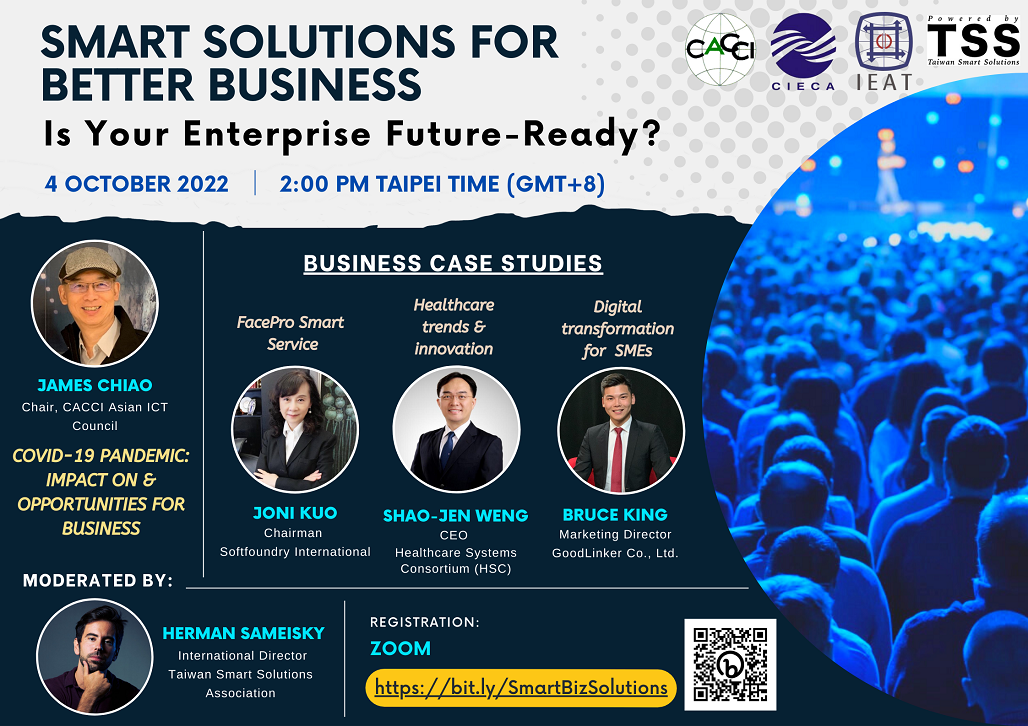
SUMMARY REPORT
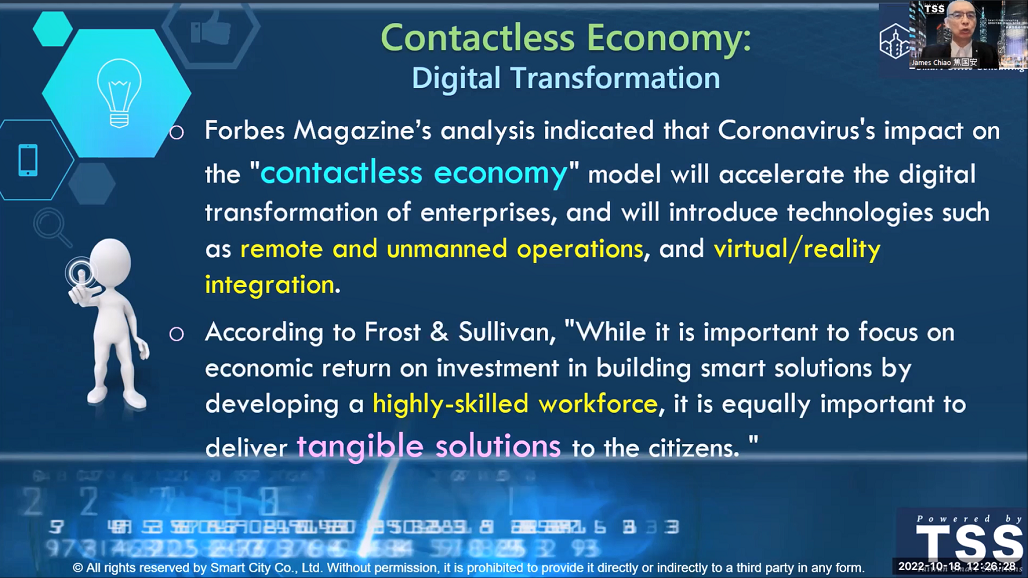
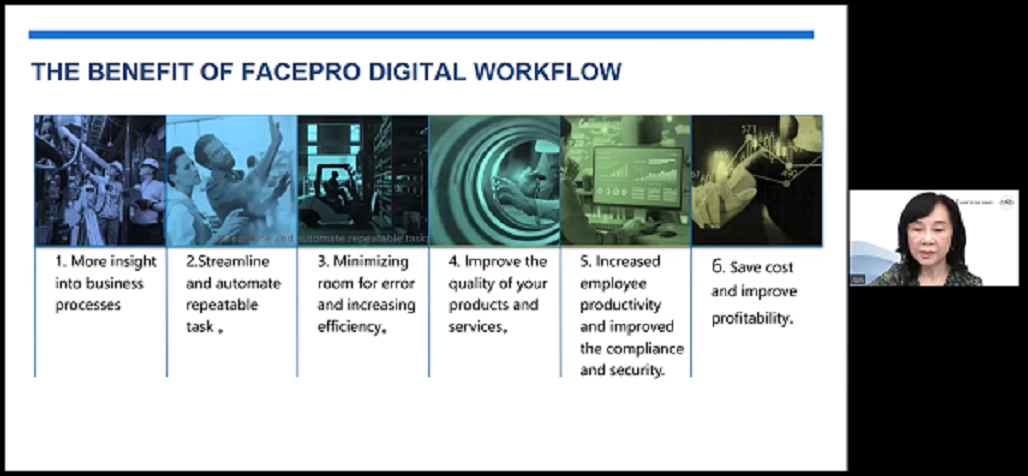
(2) Joni Kuo, Chairman of Softfoundry International Pte Ltd., introduced FacePro “5G+AR Remote Xpert” Smart Service,” which enables experts to remotely guide on-site personnel with 4K ultra-high-definition video from the first perspective and conduct troubleshooting and maintenance, which not only improves maintenance efficiency and ensures safety, but also results in a sharing of expertise and technology.
FacePro’s Xpert system has application cases in various industries, including in manufacturing, aerospace, petrochemical, smart construction, and agriculture, among others.
According to Joni, there are four main challenges most enterprises face as a result of the COVID-19 pandemic: global competition, high cost of travel in terms of both time and money, shortage of experts, and unplanned downtime losses. Addressing these challenges, FacePro can deliver remote expert guidance, digital workflow, hands-free digital assist, visualization of industrial IoT data, and build a knowledge base.
She went on to recount several use case examples: 1) remote Cosco Shipping deployed FacePro for ship inspection, remote maintenance, shipbuilding and repairing, remote guidance and support, etc; 2) SK Innovation used the RCS system for its global manufacturing site; 3) Hyundai E&C used in smart construction; 4) Porsche China launched their new Remote Technical Support System (RTS) using the FacePro Xpert system.
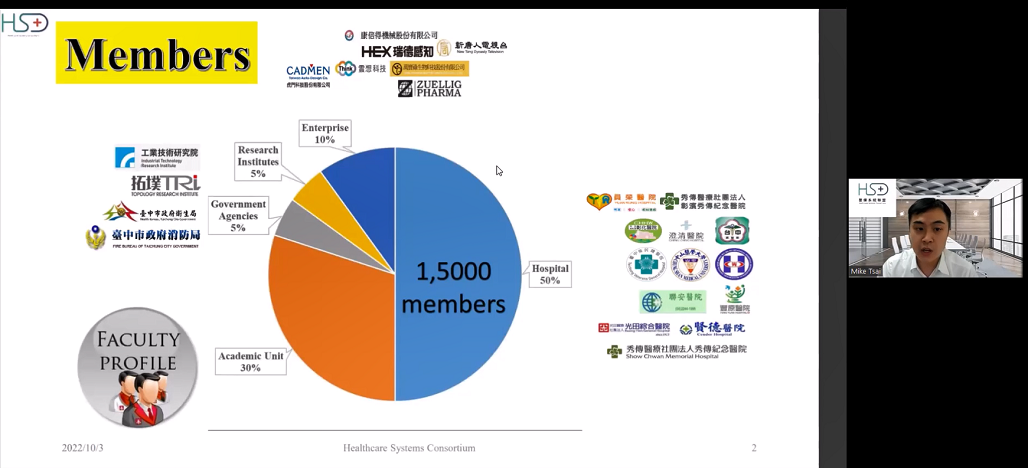
(3) Mike Tsai, speaking on behalf of Healthcare Systems Consortium (HSC) CEO Shao-Jen Weng, focused on how hospitals and health systems are positioning their organizations for the future in a post-pandemic world, and the top 10 healthcare industry trends and innovations that impact healthcare companies worldwide.
HSC is a platform that allows hospitals, enterprises, research institutes, government agencies, and universities to exchange information and find opportunities for collaboration. Funded by Taiwan’s Ministry of Science and Technology, the platform helps match hospitals and enterprises based on their needs. HSC helps with resource optimization, and the use of lean medical technologies and smart technologies to solve hospital problems. They likewise help enterprises seek out which hospitals their products may be most needed by.
Hospitals in Taiwan are run under its National Health Insurance system, and usually have limited resources to improve conditions for their patients. Thus, they turn to smart solutions to help with management, monitoring resources, and avoiding problems such as overcrowding. In some instances, smart systems are also far more reliable and less time consuming, as in the case of the surgical instrument tracking system that uses machine learning or deep learning to account for the instruments and make sure they aren’t, for example, accidentally left inside a body during an operation.
In hospitals, a wide range of smart solutions can be integrated to provide better healthcare experiences. Despite the cost, the upgrade is usually deemed necessary for institutions to keep up with both competitors and the wider sector. However, Mike emphasized that there are also smaller smart technologies and products that may be put in place which will help save patients’ lives, and which may not require such a high cost to implement.
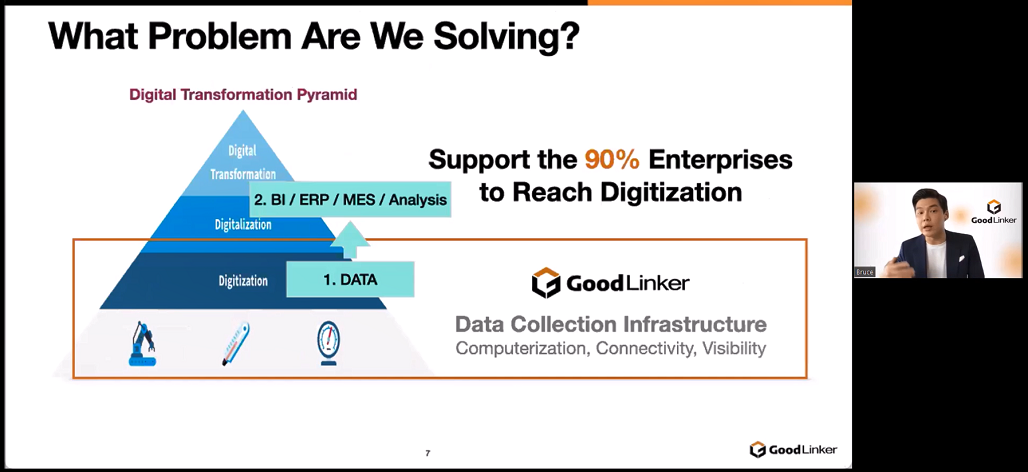
(4) Bruce King, Marketing Director of GoodLinker Co., Ltd., looked into the common barriers manufacturing SMEs face in reaching digital transformation to be smarter and more efficient. Over 90% of SMEs in Taiwan have yet to embrace digitization, and it’s usually due to three reasons: the prevalence of handwritten reports, old machines, and lack of IT talent. These all contribute to the lack of data collection and analysis, which is the foundation of digitization, and a step towards digital transformation- something GoodLinker is looking to help companies reach.
The company currently has a Cloud SaaS Service or IIoT Platform that is a cost-effective, simple, safe, and eco-friendly digital tool for quantitative management. It offers real-time monitoring, can generate history reports, and alerts when there is a malfunction in the production line. The system likewise includes paperless 24/7 recording and remote monitoring, with data that can be downloaded for analysis.
Bruce gave the use case example of a meatball factory and explained how the first step was setting up the data collection infrastructure in order to obtain data from the machines: sensor and wiring construction, followed by plug-n-play to the Goodlinker system with no code required. Based on the data collected, a year after using the system, the company reported a 62% reduction in the waste rate of raw materials, which translated to a cost reduction of about $300,000 USD a year. The Overall Equipment Effectiveness (OEE) rate also increased by 6.44%.
According to Bruce, they have serviced over 40 users not only in Taiwan, but also Southeast Asia, and have proven that the solution can be used in different industries. He added that they have also proven that the manufacturing industry is willing to use cloud solutions so long as these can solve their problems in a cost-effective way. Users, he said, prefer a total solution with full service over a product, and called on channels with SME customers, system integrators, and industry experts and consultants to team up with GoodLinker and provide smart solutions to enterprises.
The session ended with a short Q&A.
The presentation were available to registered participants only.
The video presentation of the webinar can be viewed at the CACCI YouTube channel.







